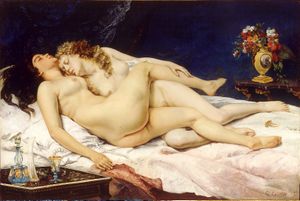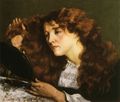النائمات
| The Sleepers | |
|---|---|
| French: Le Sommeil | |
 | |
| الفنان | گوستاڤ كوربيه |
| السنة | 1866 |
| الوسط | Oil on canvas |
| الأبعاد | 135 cm × 200 cm (53 in × 79 in) |
| الموقع | Petit Palais, Paris, فرنسا |
النائمات (فرنسية: Le Sommeil) هي erotic[1] oil painting on canvas by French artist گوستاڤ كوربيه[2] created in 1866.[3] The painting, which depicts lesbianism, is also known as the Two Friends (Les Deux Amies) and Indolence and Lust (Paresse et Luxure).
تاريخ
Le Sommeil was originally commissioned by the Turkish diplomat and art collector of the late Ottoman era, Halil Şerif Paşa, who had lived in Paris since 1860.[4][5] The painting was not permitted to be shown publicly until 1988, like a number of his other works such as L'Origine du monde. When Le Sommeil was exhibited by a picture dealer in 1872, it became the subject of a police report.[6] One of the models for the painting was Joanna Hiffernan, who was the mistress of fellow painter James Abbott Whistler at the time. Whistler's relationship with Hiffernan ended soon afterwards, and his opinion of Courbet soured.[1]
The Encyclopedia of Lesbian and Gay Histories and Cultures describes Le Sommeil as a "famous" painting. The painting created an impact in 19th-century art, because after the public display of Le Sommeil, a number of contemporary artists were influenced by the theme of lesbian couples. Repetition of this theme helped to lower the taboos associated with lesbian relationships.[3]
Today Le Sommeil is in the collection of the Petit Palais, a Paris museum.[4]
وصف
The painting shows two naked women lying asleep on a bed entwined in an erotic embrace, resting after sexual intercourse.[2]
The setting is a bedroom with various textiles and ornamental furnishing. In the background there is a dark blue velvet curtain and in the right corner a table with a decorative flower vase. In the foreground is a small wooden table holding three items – a colored flacon (a small vessel), a transparent crystal vase, and a cup. Except for these few furnishings, there is nothing in the painting to overshadow the main image – the women.[1]
One of the sleeping women is redhead, the other is brunette. For color contrast, Courbet worked curves between the women. A broken pearl necklace and a hairpin scattered in the bed reference the nature of their previous activity.[1]
تحليل
The painting was inspired by Charles Baudelaire's poem "Delphine et Hippolyte", from his collection Les Fleurs du mal.[2][7][8] Le Sommeil has been interpreted as a realist painting, detailing the bodies without glossing over their imperfections.[1]
معرض لوحات
Constance Quéniaux (par Nadar) modèle supposé femme brune
المراجع
- ^ أ ب ت ث ج Dorothy M. Kosinski, Gustave Courbet's The Sleepers. The Lesbian Image in Nineteenth Century French Art and Literature, Artibus et Historiae, Vol. 9, No. 18 (1988), p.187
- ^ أ ب ت Wendy Michallat (2007). Lesbian inscriptions in Francophone society and culture. Durham Modern Languages. p. 8. ISBN 978-0-907310-62-4. Retrieved 17 February 2012.
- ^ أ ب George Haggerty; Bonnie Zimmerman (2000). Encyclopedia of lesbian and gay histories and cultures. Taylor & Francis. p. 311. ISBN 978-0-8153-3354-8. Retrieved 17 February 2012.
- ^ أ ب Le Sommeil, Petit Palais
- ^ Griselda Pollock (1999). Differencing the canon: feminist desire and the writing of art's histories. Routledge. p. 315. ISBN 978-0-415-06700-3. Retrieved 18 February 2012.
- ^ Sarah Faunce; Linda Nochlin (1988). Courbet reconsidered. Brooklyn Museum. p. 176. ISBN 978-0-300-04298-6. Retrieved 18 February 2012.
- ^ Elisabeth Ladenson (2007). Dirt for art's sake: books on trial from Madame Bovary to Lolita. Cornell University Press. pp. 75–. ISBN 978-0-8014-4168-4. Retrieved 17 February 2012.
- ^ Elisabeth Ladenson (April 2007). Proust's Lesbianism. Cornell University Press. p. 25. ISBN 978-0-8014-7350-0. Retrieved 17 February 2012.



